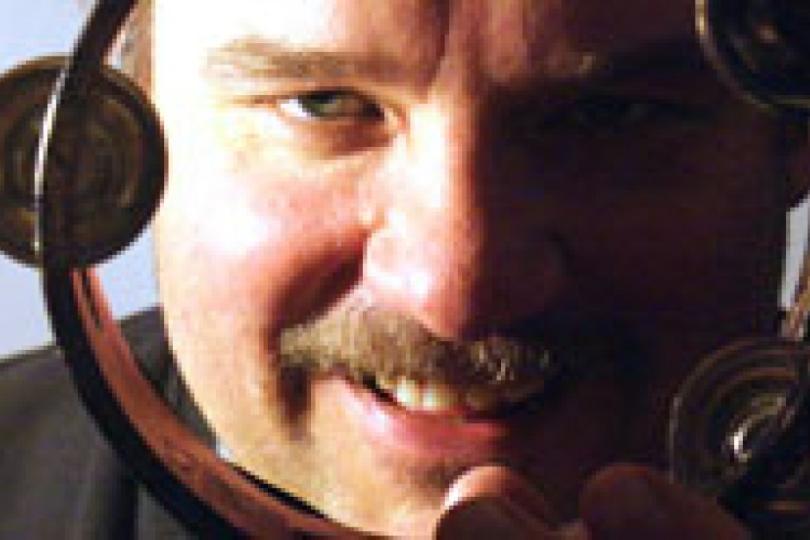REVIEW: 'The Music Man' from Ten Thousand Things
Review

I actually happen to be working on a couple of musicals — I find myself talking about the form all the time. Apparently, there’s lots of people who really don’t like musicals, many of them colleagues of mine. Probe into this dislike and you’ll find one of two things. Either the person you’re speaking with has never seen a proper musical, or, what’s more common among my fellow theatre-makers, they find music-theatre “unbelievable”: “I mean, why would anybody just burst out singing — it’s ridiculous.”
This is mind-boggling to me not only because I suckled at the teat of the American Musical. I have a hard time processing how one aspect of theatre can be “more fake” than any other. Why singing is more of a cheat than 1) artificial lighting, 2) made-up dialogue, 3) costumes (no matter how basic, they’re always carefully chosen), 4) choreographed movement (seen in many forms other than music-theater) — I could go on and on. For some people, there’s a magic line between “real” and “artifice” and Eliza belting out “Wouldn’t That Be Loverly” crosses it every time.
That audiences across our country treasure music-theatre only seems to fan the ire.
I thought of this during Ten Thousand Things’ aggressively theatrical production of The Music Man, playing through March 9 at Open Book on Washington Ave. Not only do most of the characters sing — even more improbably, sometimes they recite the lyrics with only slight musical accompaniment — a kind of ersatz patter reminiscent of carnival barkers. But that’s only the beginning of the nonsense. Many of the male roles are played by women, many of the women are played by men — a doubling that reaches its crescendo when the All Male Chorus of Townspeople sings a duet with the All Female Chorus — both Choruses represented by the same four actors of mixed gender and race, in effect singing a duet with themselves.
The reaction from the audience to this festival of impossibilities: pure joy.
I was reminded of a reading I saw years ago at The Bay Area Playwrights Festival. A woman sits in a chair, a man stands beside her. As the stage directions are read, we learn the woman is driving a car—and the actress puts her hands on the imaginary steering wheel — while a raven flies beside her window — and the actor billows out his arms as if they are wings. A ripple of childish joy spread throughout the audience: of course this was a car and raven—anyone could see that now. In my surlier moments (that beer is well-named) I imagine commercial theatre and some precincts of the avant-garde joined in a conspiracy against this joy. The former wanting only to pick our pockets, the latter, have us shut up and take our medicine, be “challenged,” learn from our betters.
While even the darkest musicals are more like the dumb country cousin that just wants to go contra dancing, see the Big Spoon, and have a good time. To feel, in other words, alive.
For those of you unfamiliar with The Music Man, it tells the story of Professor Harold Hill, a con artist barnstorming the Midwest in the early 1900s. He hits the small town of River City, Iowa, ready to pull his usual scam, which involves convincing the town to invest in a marching band that doesn’t exist (I’ve seen the movie several times, I’ve seen the play—I’m still not sure how he makes money on this scheme). Hill’s biggest stumbling block is Marion, the town librarian and amateur musicologist. That he and Marion go back and forth between enmity and romance will surprise no one who’s seen a Nora Ephron movie. What’s more interesting is the idea that slick city-folk and small-town librarians each have something to offer. As in a fairy tale, one discovers a more broadened and imaginative view of the world—while the other discovers his heart.
Ten Thousand Things Artistic Director Michelle Hensley has developed a very specific aesthetic: because the work is brought into prisons and shelters across the Cities, there’s very little set and minimal costumes (made to seem abundant nonetheless by Joel Sass and Mary Anna Culligan, respectively). The lights never go down, and the audience surrounds the actors — we can see them, they can see us — we can also see most of our fellow spectators. Music Man is directed by the gifted Lear deBessonet (from NYC)—but that only reinforces the basic premise—guest directors play by Ms. Hensley’s rules.
The result is a kind of 3-D focus on the actors. As loath as those of us who write and direct may be to admit it, nothing pleases an audience more. Especially since Ten Thousand Things knows how to pick ‘em: Luverne Siefert, Aimee Bryant, Bradley Greenwald, Jim Lichtscheidl, Kimberly Richardson, Ricardo Vasquez, Sara Agnew and Dennis Spears make an ensemble piece out of what is often played as a pas de deux. Conducted by Ms. deBessonet, they are constantly alive on stage, both as performers and characters — creating a bustling Midwestern town that, at the same time, never ceases to be the back room of Open Book. This joy in artifice creates a tremendous sense of shared space — we are all together in the room, nothing is presented as real, and so we are invited — rather than coerced or bribed — to take pleasure in all that unfolds.
This playfulness also helps smooth over some of the piece’s dated material (the repetition of “old maid” gets tiresome) allowing us to see the more contemporary issues hidden by mid-twentieth century etiquette. After all, what man or woman, still single at a certain age, doesn’t worry they might end up alone? And what man or woman who has spent their romantic energy “taking it away” from an assortment of partners isn’t secretly concerned they missed something for all that action? Played heavily we might resist these parallels — but the company’s light touch leaves us room to participate on more
than one level.
Of course there has to be a paragraph of caveats (I’m already getting impatient with the Critical Essay). Music Director Peter Vitale and Conductor Jake Endres do a terrific job with their minimalist orchestra, but I’m still irked by this practice of not quite singing many of the songs (the same held true in TTT’s Man of La Mancha). For a company so dedicated to the audience, it seems an odd choice. Especially in this case, where we are taunted by the presence of Bradley Greenwald, whose incredible instrument is mostly kept under wraps.
Reluctant as I am to give any ground to “it’s just a matter of taste” — in this case that might actually be true. Some of you, like me, will miss the kind of expansive range singer-actors like Mr. Greenwald bring to the table — for others, the ample talent of this company and their effortless celebration of theatrical joy will be more than enough.




